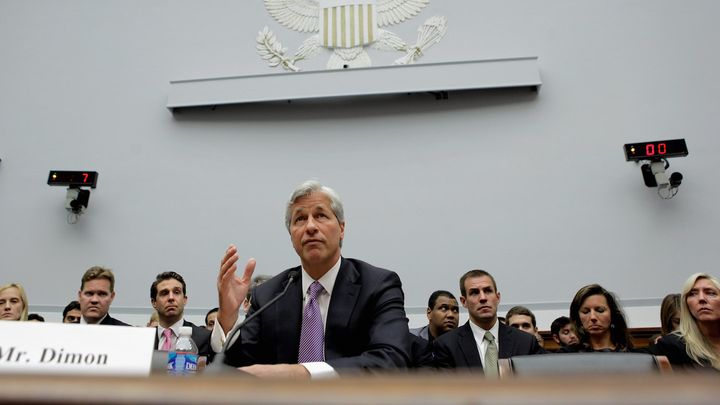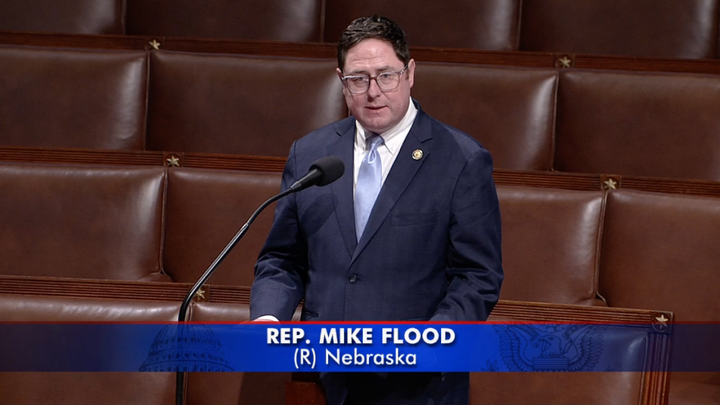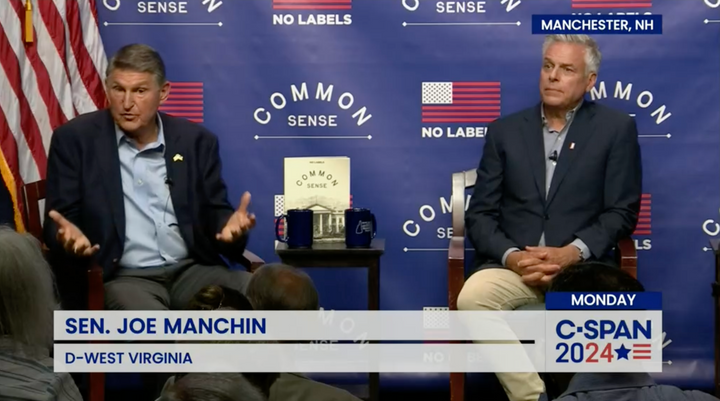When the CEOs of seven of the largest financial institutions in the U.S. appear before the House Financial Service Committee on Wednesday for a hearing on “holding megabanks accountable,” they will be questioned by representatives who collectively own as much as $1.6 million worth of stock in the companies.
According to financial disclosure reports reviewed by Sludge, 10 members of the House Financial Services Committee—six Democrats and four Republicans—own stock in at least one of the seven banks represented at the hearing, totaling between $548,000 and close to $1.6 million.
The financial institutions that will be represented at the hearing—Citigroup, JPMorgan Chase, Morgan Stanley, Bank of America, State Street, Bank of New York Mellon, and Goldman Sachs—were key players in the 2008 financial crisis. The banks, which were loaded up with bad debt acquired through aggressive mortgage lending and rampant speculation, had grown so large and interconnected that regulators judged their potential failure an untenable risk to the global financial system. They all received billions of dollars in bailout funding under the Troubled Assets Relief Program and other programs.
Since then, these banks have grown larger, and the problem of “too big to fail” in the banking industry is generally considered unresolved.
The banks that will be represented at the hearing have spent millions on lobbying Congress since the crisis, and they have been wildly successful at beating back attempts to rein them in. The 2010 Dodd-Frank Wall Street Reform and Consumer Protection Act was Congress’ major response to the crisis, but it did not directly address industry consolidation and systemic risk, so many experts believe that it is not likely to prevent future bailouts should these giant banks face insolvency. An amendment to limit the size of financial institutions and force the breakup of some of these banks was roundly rejected.
The megabanks have had several deregulatory victories since the Dodd-Frank Act was passed. Most recently, all of these banks besides State Street lobbied Congress on S. 2155, a major deregulatory bill that was signed into law in 2018. The bill reduces oversight of large and mid-size banks by raising a key threshold used by regulators to determine which banks pose systemic risks to the financial system. The deregulated banks will face fewer stress tests and have more lenient capital and liquidity requirements, allowing them to take on more debt. It also requires the Federal Reserve to custom tailor its rules for large banks, a provision that prompted the Fed to create tiers of more relaxed regulation for banks with more than $100 billion in assets.
Here are the relevant financial holdings of the 10 members and their spouses as of the latest available financial disclosures.*
- Al Lawson (D-Fla.) owns between $215,000 and $550,000 worth of stock in Bank of America (2017 financial disclosure document)
- Dean Phillips (D-Minn.) owns between $100,000 and $325,000 worth of stock in all seven big banks, including between $50,000 and $100,000 in JPMorgan Chase. (disclosure)
- John Rose (R-Tenn.) owns between $115,000 and $300,000 worth of stock in Bank of America. (disclosure)
- Scott Tipton (R-Colo.) owns between $46,000 and $165,000 worth of stock in Bank of America (between $31,000 and $115,000) and in JPMorgan Chase (between $15,000 and $50,000). (disclosure)
- Anthony Gonzalez (R-Ohio) owns between $50,000 and $100,000 worth of stock in Goldman Sachs. (disclosure)
- Katherine Clark (D-Mass.) owns between $17,000 and $80,000 worth of stock in JPMorgan Chase. (disclosure)
- Josh Gottheimer (D-N.J.) owns between $3,000 and $45,000 worth of stock in Goldman Sachs, JPMorgan Chase, and Morgan Stanley. (disclosure)
- Bryan Steil (R-Wisc.) owns between $1,000 and $15,000 worth of stock in JPMorgan Chase. (disclosure)
- Joyce Beatty (D-Ohio) owns between $1,000 and $15,000 worth of stock in JPMorgan Chase. (disclosure)
- Jennifer Wexton (D-Va.) owns between $1 and $1,000 worth of stock in Bank of America and between $1 and $1,000 worth of stock in Citigroup. (disclosure)
Congress currently has no rules regarding stock ownership aside from its ban on insider trading, codified in the 2012 STOCK Act. Members are not required to disclose their financial holdings or recuse themselves, even when their committees directly oversee industries in which they are personally invested or when they will be questioning officials from companies in which they have a financial stake.
Sen. Elizabeth Warren (D-Mass.) introduced legislation in August that would “eliminate both the appearance and the potential for financial conflicts of interest” by banning members of Congress, Cabinet secretaries, federal judges, White House staff, senior congressional staff, and other officials from owning individual stocks, bonds, commodities, futures, and other forms of securities while in office. This provision is part of her sweeping Anti-Corruption and Public Integrity Act, which progressive Rep. Pramila Jayapal (D-Wash.) has introduced in the House.
Sens. Sherrod Brown (D-Ohio) and Jeff Merkley (D-Ore.) introduced the Ban Conflicted Trading Act in December to bar members of Congress and senior staff from trading individual corporate stocks while in office. Members and staff would have six months to make any stock divestitures after the act’s passage or the beginning of their first term in Congress.
*Methodology: Sludge consulted the 2017 annual financial disclosures and any subsequent periodic transaction reports to arrive at current investment totals. Members are required to submit transaction reports within 45 days of a purchase or sale of stock worth more than $1,000, so it’s possible some transactions have not yet been made public. Investment amounts are listed in dollar ranges, not exact figures.
Sludge used its new searchable database of members of Congress’ financial investments, which currently does not include data on members who file handwritten reports. A majority file electronically.
Related:



